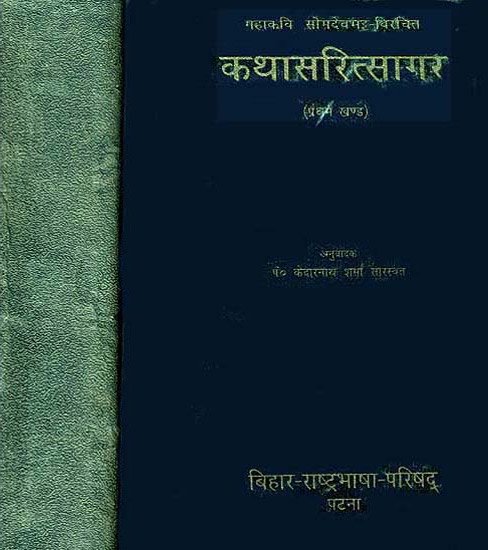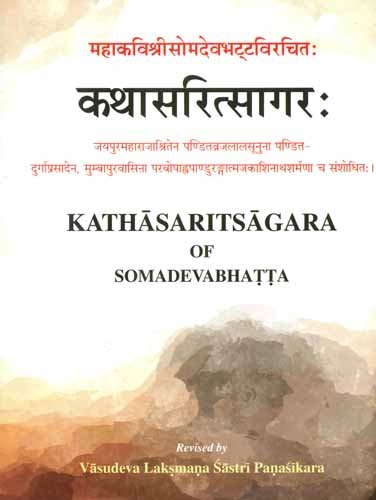Kathasaritsagara [sanskrit]
by C. H. Tawney | 2014 | 226,424 words | ISBN-13: 9789350501351
The Sanskrit edition of the Kathasaritsagara referencing the English translation and grammatical analysis. Written by Somadeva and dating from the 12th century, the Kathasaritsagara (or Katha-sarit-sagara) represents an epic legend narrating the adventures of Naravahanadatta as he strives to become the destined emperor of the Vidyadharas. Alternative titles: (Kathāsaritsāgara, कथासरित्सागर, Kathā-sarit-sāgara)
Verse 18.2.123
तेनायमावयोर् जातः संयोगो ऽन्योन्यसंमतः ।
श्वश् च नाकाच्चिरेणैष्याभ्यहं मा भूच् च ते ऽधृतिः ॥ १२३ ॥
tenāyamāvayor jātaḥ saṃyogo 'nyonyasaṃmataḥ |
śvaś ca nākāccireṇaiṣyābhyahaṃ mā bhūc ca te 'dhṛtiḥ || 123 ||
The English translation of Kathasaritsagara Verse 18.2.123 is contained in the book The Ocean of Story by C.H. Tawney. This book is available online or you could buy the latest edition:
Read online Buy now! The English translation by C.H. Tawney (2014)
Glossary of Sanskrit terms
Note: This extracts Sanskrit terms and links to English definitions from the glossary, based on an experimental segmentation of verse (18.2.123). Some terms could be superfluous while some might not be mentioned. Click on the word to show English definitions.
Tena, Jatri, Jata, Samyoga, Anyonya, Mata, Naka, Cirena, Cira, Eshin, Eshya, Aha, Asmad, Mas, Tad, Yushmad, Adhriti,
Analysis of Sanskrit grammar
Note: this is an experimental feature and only shows the first possible analysis of the Sanskrit text (Kathasaritsagara Verse 18.2.123). If the system was successful in segmenting the sentence, you will see of which words it is made up of, generally consisting of Nouns, Pronouns, Verbs, Participles and Indeclinables. Click on the link to show all possible derivations of the word.
- Line 1: “tenāyamāvayor jātaḥ saṃyogo 'nyonyasaṃmataḥ ”
- tenāya -
-
tena (noun, masculine)[dative single]
- māva -
-
ma (noun, masculine)[nominative dual], [vocative dual], [accusative dual]mu (noun, masculine)[locative single]√mā (verb class 2)[imperative active first dual]
- ayor -
-
a (noun, masculine)[genitive dual], [locative dual]ā (noun, feminine)[genitive dual], [locative dual]e (noun, masculine)[genitive dual], [locative dual]
- jātaḥ -
-
jātṛ (noun, feminine)[vocative single]jāta (noun, masculine)[nominative single]√jan -> jāta (participle, masculine)[nominative single from √jan class 1 verb], [nominative single from √jan class 2 verb], [nominative single from √jan class 3 verb], [nominative single from √jan class 4 verb]
- saṃyogo' -
-
saṃyoga (noun, masculine)[nominative single]
- anyonya -
-
anyonya (noun, masculine)[compound], [vocative single]anyonya (noun, neuter)[compound], [vocative single]
- saṃ -
-
sa (noun, neuter)[adverb], [nominative single], [accusative single]
- mataḥ -
-
mata (noun, masculine)[nominative single]√man -> mata (participle, masculine)[nominative single from √man class 4 verb], [nominative single from √man class 8 verb]
- Line 2: “śvaś ca nākāccireṇaiṣyābhyahaṃ mā bhūc ca te 'dhṛtiḥ ”
- Cannot analyse śvaś*ca
- ca -
-
ca (indeclinable conjunction)[indeclinable conjunction]ca (noun, masculine)[compound], [vocative single]ca (noun, neuter)[compound], [vocative single]
- nākāc -
-
nāka (noun, masculine)[adverb], [ablative single]nāka (noun, neuter)[adverb], [ablative single]
- cireṇai -
-
cireṇa (indeclinable)[indeclinable]cira (noun, masculine)[instrumental single]cira (noun, neuter)[instrumental single]
- eṣyā -
-
eṣin (noun, masculine)[compound], [adverb], [nominative single]eṣin (noun, neuter)[compound], [adverb], [nominative single], [vocative single], [accusative single]eṣya (noun, masculine)[compound], [vocative single]eṣya (noun, neuter)[compound], [vocative single]√eṣ -> eṣya (absolutive)[absolutive from √eṣ]eṣyā (noun, feminine)[nominative single]√iṣ -> eṣya (participle, masculine)[vocative single from √iṣ class 6 verb]√iṣ -> eṣya (participle, neuter)[vocative single from √iṣ class 6 verb]√iṣ -> eṣyā (participle, feminine)[nominative single from √iṣ class 6 verb]√iṣ -> eṣya (participle, masculine)[vocative single from √iṣ class 1 verb], [vocative single from √iṣ class 4 verb]√iṣ -> eṣya (participle, neuter)[vocative single from √iṣ class 1 verb], [vocative single from √iṣ class 4 verb]√iṣ -> eṣyā (participle, feminine)[nominative single from √iṣ class 1 verb], [nominative single from √iṣ class 4 verb]√i (verb class 2)[present active second single]
- ābhya -
-
- aham -
-
aha (noun, neuter)[adverb], [nominative single], [accusative single]asmad (pronoun, none)[nominative single]
- mā* -
-
ma (noun, masculine)[nominative plural], [vocative plural]mā (noun, feminine)[nominative plural], [vocative plural], [accusative plural]mās (noun, masculine)[nominative single]
- bhūc -
-
√bhū (verb class 1)[injunctive active third single]
- ca -
-
ca (indeclinable conjunction)[indeclinable conjunction]ca (noun, masculine)[compound], [vocative single]ca (noun, neuter)[compound], [vocative single]
- te' -
-
ta (noun, masculine)[locative single]ta (noun, neuter)[nominative dual], [vocative dual], [accusative dual], [locative single]tā (noun, feminine)[nominative dual], [vocative single], [vocative dual], [accusative dual]tad (noun, neuter)[nominative dual], [accusative dual]sa (noun, masculine)[nominative plural]sā (noun, feminine)[nominative dual], [accusative dual]yuṣmad (pronoun, none)[dative single], [genitive single]
- adhṛtiḥ -
-
adhṛti (noun, feminine)[nominative single]adhṛti (noun, masculine)[nominative single]
Other editions:
Also see the following editions of the Sanskrit text or (alternative) English translations of the Kathasaritsagara Verse 18.2.123
Kathasaritsagar
by Kedarnath Sharma Saraswat (2005)
The Only Edition with the Sanskrit Text and its Hindi Translation (An Old and Rare Book) Set of 3 Vol.
Buy now!
Kathasaritsagara of Somadeva Bhatta (Sanskrit Text Only)
by Vasudeva Laksmana Sastri (2013)
Katha Sarit Sagar in Marathi
by H. A Bhave (1995)
Set of 5 Volumes; Published by Varada Books, Pune. 2256 pages (Throughout B/W Illustrations).
Buy now!
Katha Sarit Sagara (Tamil)
by S. V. Ganapati (எஸ். வி. கணபதி) (2014)
[கதா சரித் சாகரம்] Published by Alliance Publications.
Buy now!
Galpa Shono
by Abhijit Chattopadhyay (2014)
[গল্প শোনো] Galpa Shono: Bengali Translation of 'Suno Kahani From Katha Sarit Sagar'; 9788126015436; Published by Sahitya Akademi, Delhi.
Buy now!Preview of verse 18.2.123 in Bengali sript:
তেনাযমাবযোর্ জাতঃ সংযোগো ঽন্যোন্যসংমতঃ ।
শ্বশ্ চ নাকাচ্চিরেণৈষ্যাভ্যহং মা ভূচ্ চ তে ঽধৃতিঃ ॥ ১২৩ ॥
![Kathasaritsagara [sanskrit] - book cover](/uploads/a/Katha-Sarit-Sagara.jpg)




